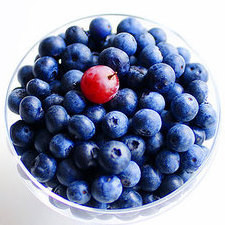one.Spinach The French nicknamed this green herb "a broom for the stomach" for a reason: it helps to remove toxins and toxins from the body! In terms of folic acid content, spinach is second only to parsley; a rich set of B vitamins has a beneficial effect on the nervous system, and vitamin E protects the cells of the body from premature aging. It is especially indicated for pregnant women and people with poor health. By the way, spinach also has an anti-sclerotic effect, strengthens the capillaries. For children, spinach is recommended for growth disorders. In many countries, they are an indispensable part of the diet for babies. It prevents the development of rickets and helps the construction of the skeletal system. Substitutes: white cabbage, pacchai salad, lettuce. Recommended daily allowance: 1 cup fresh or 1/2 cup cooked spinach. As-is: Add spinach to salads, sandwiches, scrambled eggs and scrambled eggs, sprinkle on pizzas and other hot dishes.  Simple meals for every day 2.Yoghurt Natural "live" yoghurts contain a huge amount of calcium, potassium, vitamin B, and most importantly - live bifido cultures, which help to improve the functioning of the digestive system and strengthen the immune system. Regular consumption of natural yoghurts prevents colon cancer and breast cancer (by strengthening the immune system). Substitutes: kefir, yogurt, fermented baked milk. Recommended daily allowance: 1 glass of live yogurt (containing at least 300 mg of calcium). As it is: Add nuts and honey, fruits and berries to yogurt, make with natural yogurt, use it as a dressing for salads and morning cereals.
Simple meals for every day 2.Yoghurt Natural "live" yoghurts contain a huge amount of calcium, potassium, vitamin B, and most importantly - live bifido cultures, which help to improve the functioning of the digestive system and strengthen the immune system. Regular consumption of natural yoghurts prevents colon cancer and breast cancer (by strengthening the immune system). Substitutes: kefir, yogurt, fermented baked milk. Recommended daily allowance: 1 glass of live yogurt (containing at least 300 mg of calcium). As it is: Add nuts and honey, fruits and berries to yogurt, make with natural yogurt, use it as a dressing for salads and morning cereals.  3 Tomatoes Fresh tomatoes are the perfect food to compensate for the loss of minerals. They contain potassium (good for the heart, helps eliminate excess fluid from the body), magnesium (helps the body adapt to cold), iron (recommended for anemia), zinc (necessary for the growth of skin, hair, and wound cells), calcium (strengthens bones ), phosphorus (involved in metabolic processes). Tomatoes contain a large amount of organic acids that are necessary for our body to work normally, as well as quite a lot of vitamins - B1, B2, B3, B6, B9, E, but most of them are vitamin C. But the most valuable thing in tomatoes is substance Lycopene is an organic compound that gives the fruit a rich red color, is a very strong natural antioxidant and is able to prevent the development of cancers of the intestine, esophagus, stomach, and lungs. The most effective lycopene in female oncology. In addition, it significantly reduces the risk of developing cardiovascular diseases. Since lycopene is a fat-soluble substance, the use of tomatoes increases if they are eaten with vegetable oil or with sour cream and sauces on a fat basis. Lycopene has a unique property not to collapse during heat treatment, but even, on the contrary, to increase. Lycopene, however, is not rich in all varieties of tomatoes, but only red. Tomatoes treat not only the body, but also the soul: they have “ready” serotonin, thanks to which tomatoes improve mood, and in stressful situations they work as antidepressants. Another pleasant and very useful property of tomatoes is low calorie content (23 kcal per 100g). And chromium in their composition contributes to faster saturation and prevents attacks of “brutal” hunger. Just remember that the tomato “dosage” should be limited to people suffering from metabolic disorders and allergies to red vegetables and fruits, as well as migraines. Substitutes: watermelon, red grapefruit, papaya. Recommended rate per day: 8 cherry tomatoes or 1 glass of tomato juice. How to eat: add to salads, eat fresh, make red sauces to tomato-based pasta, add to soups, omelets and hot meat dishes.
3 Tomatoes Fresh tomatoes are the perfect food to compensate for the loss of minerals. They contain potassium (good for the heart, helps eliminate excess fluid from the body), magnesium (helps the body adapt to cold), iron (recommended for anemia), zinc (necessary for the growth of skin, hair, and wound cells), calcium (strengthens bones ), phosphorus (involved in metabolic processes). Tomatoes contain a large amount of organic acids that are necessary for our body to work normally, as well as quite a lot of vitamins - B1, B2, B3, B6, B9, E, but most of them are vitamin C. But the most valuable thing in tomatoes is substance Lycopene is an organic compound that gives the fruit a rich red color, is a very strong natural antioxidant and is able to prevent the development of cancers of the intestine, esophagus, stomach, and lungs. The most effective lycopene in female oncology. In addition, it significantly reduces the risk of developing cardiovascular diseases. Since lycopene is a fat-soluble substance, the use of tomatoes increases if they are eaten with vegetable oil or with sour cream and sauces on a fat basis. Lycopene has a unique property not to collapse during heat treatment, but even, on the contrary, to increase. Lycopene, however, is not rich in all varieties of tomatoes, but only red. Tomatoes treat not only the body, but also the soul: they have “ready” serotonin, thanks to which tomatoes improve mood, and in stressful situations they work as antidepressants. Another pleasant and very useful property of tomatoes is low calorie content (23 kcal per 100g). And chromium in their composition contributes to faster saturation and prevents attacks of “brutal” hunger. Just remember that the tomato “dosage” should be limited to people suffering from metabolic disorders and allergies to red vegetables and fruits, as well as migraines. Substitutes: watermelon, red grapefruit, papaya. Recommended rate per day: 8 cherry tomatoes or 1 glass of tomato juice. How to eat: add to salads, eat fresh, make red sauces to tomato-based pasta, add to soups, omelets and hot meat dishes.  four. Carrots Carrots are included in the list of necessary daily products, of course, due to the content of carotene and vitamin A, which help not only maintain visual acuity at the proper level, but also improve it. So for children, people who work all day at a computer or those who are engaged in sedentary work with eye loads, carrots are an invaluable product. In addition, the carrot is very rich in vitamins of group B, contains such essential acids for our body as nicotinic and folic acids. It is because of such a rich content of nutrients that carrots are recommended to include in the diet all nutritionists. As they say, a minimum of calories and a maximum of nutrients, vitamins and trace elements. Substitutes: sweet potato, mango, pumpkin. Recommended rate per day: 1-2 carrots or 1/2 cup of carrot juice. As is: A feature of carrots is that it is best absorbed in the presence of fats. That is why it is advisable to cook carrot dishes with vegetable or butter, sour cream.
four. Carrots Carrots are included in the list of necessary daily products, of course, due to the content of carotene and vitamin A, which help not only maintain visual acuity at the proper level, but also improve it. So for children, people who work all day at a computer or those who are engaged in sedentary work with eye loads, carrots are an invaluable product. In addition, the carrot is very rich in vitamins of group B, contains such essential acids for our body as nicotinic and folic acids. It is because of such a rich content of nutrients that carrots are recommended to include in the diet all nutritionists. As they say, a minimum of calories and a maximum of nutrients, vitamins and trace elements. Substitutes: sweet potato, mango, pumpkin. Recommended rate per day: 1-2 carrots or 1/2 cup of carrot juice. As is: A feature of carrots is that it is best absorbed in the presence of fats. That is why it is advisable to cook carrot dishes with vegetable or butter, sour cream.  five. Blueberries In addition to the well-known properties of blueberries, a beneficial effect on our eyesight, there are other equally important ones. For example, the fact that the berry contains a large amount of antioxidants that are necessary for the health of the body. They have a preventive effect, reducing the risk of many diseases, such as cancer, diabetes, cardiovascular diseases. Researchers believe that these substances help reduce the number of dying brain cells, and therefore help fight age-related changes in memory. Substitutes: black grapes, raisins, prunes, strawberries. Recommended rate per day: 1 cup fresh or 1/2 cup frozen or dried blueberries. How to eat: the beneficial properties of blueberries are perfectly preserved in dried, frozen and canned forms: you can add berries to smoothies and cocktails, brew tea, as well as lean on blueberry jams.
five. Blueberries In addition to the well-known properties of blueberries, a beneficial effect on our eyesight, there are other equally important ones. For example, the fact that the berry contains a large amount of antioxidants that are necessary for the health of the body. They have a preventive effect, reducing the risk of many diseases, such as cancer, diabetes, cardiovascular diseases. Researchers believe that these substances help reduce the number of dying brain cells, and therefore help fight age-related changes in memory. Substitutes: black grapes, raisins, prunes, strawberries. Recommended rate per day: 1 cup fresh or 1/2 cup frozen or dried blueberries. How to eat: the beneficial properties of blueberries are perfectly preserved in dried, frozen and canned forms: you can add berries to smoothies and cocktails, brew tea, as well as lean on blueberry jams.  6 Black beans and beansAll beans are good for the heart, but nothing activates your brain better than black beans. This is because they are rich in antioxidants and anthocyanins, which improve brain function. And eating beans at least twice a week can reduce the risk of breast cancer in women. The composition of legumes includes the most valuable dietary proteins (amino acids close to meat), a large amount of coarse fiber, mineral salts and vitamins, and since legumes are low-glycemic foods, they are slowly absorbed and do not increase glucose, therefore they are especially suitable for diabetic and unloading diets. Regular consumption of legumes causes a rejuvenating effect. Substitutes: peas, lentils. Recommended rate per day: 12 cups of beans. How to eat: add black and red beans to chili; Puree one cup of black beans with 1/4 cup of olive oil and roasted garlic, add the beans to the pasta sauces.
6 Black beans and beansAll beans are good for the heart, but nothing activates your brain better than black beans. This is because they are rich in antioxidants and anthocyanins, which improve brain function. And eating beans at least twice a week can reduce the risk of breast cancer in women. The composition of legumes includes the most valuable dietary proteins (amino acids close to meat), a large amount of coarse fiber, mineral salts and vitamins, and since legumes are low-glycemic foods, they are slowly absorbed and do not increase glucose, therefore they are especially suitable for diabetic and unloading diets. Regular consumption of legumes causes a rejuvenating effect. Substitutes: peas, lentils. Recommended rate per day: 12 cups of beans. How to eat: add black and red beans to chili; Puree one cup of black beans with 1/4 cup of olive oil and roasted garlic, add the beans to the pasta sauces. 7 WalnutsThe walnut kernels have all the necessary substances to maintain human life, about 20% of proteins (they are not inferior in animal proteins), about 75% of high-calorie fats. By calorie walnut is just a record holder! In addition, it contains vitamins A, B1, B6, C, P, tannins, essential oils, volatile production. Walnuts are richer with omega-3 acids for the heart than salmon, and polyphenols are better charged than red wine. Substitutes: pistachio, hazelnut, almond, peanut. Recommended daily rate: 7 nuts. How to eat: if you can not eat in its natural form, add to yogurt, fruit salads, cereals, pastries and desserts.
7 WalnutsThe walnut kernels have all the necessary substances to maintain human life, about 20% of proteins (they are not inferior in animal proteins), about 75% of high-calorie fats. By calorie walnut is just a record holder! In addition, it contains vitamins A, B1, B6, C, P, tannins, essential oils, volatile production. Walnuts are richer with omega-3 acids for the heart than salmon, and polyphenols are better charged than red wine. Substitutes: pistachio, hazelnut, almond, peanut. Recommended daily rate: 7 nuts. How to eat: if you can not eat in its natural form, add to yogurt, fruit salads, cereals, pastries and desserts. eight. Oats According to nutritionists, oats are one of the most beneficial cereals for our health. It regulates fat metabolism, eliminates toxins and lowers blood sugar levels. Now they have learned to process oats in such a way as to preserve the level of fiber in the cereal, so you can fill the lack of dietary fiber with the help of bran and products containing oats.
eight. Oats According to nutritionists, oats are one of the most beneficial cereals for our health. It regulates fat metabolism, eliminates toxins and lowers blood sugar levels. Now they have learned to process oats in such a way as to preserve the level of fiber in the cereal, so you can fill the lack of dietary fiber with the help of bran and products containing oats.  Substitutes: quinoa, flaxseeds, wild rice.Recommended amount per day: 1/2 cup oats. How to eat: eat oatmeal for breakfast, oatmeal with milk or yogurt, bread, oatmeal cookies. Based on BestLifeonline.com
Substitutes: quinoa, flaxseeds, wild rice.Recommended amount per day: 1/2 cup oats. How to eat: eat oatmeal for breakfast, oatmeal with milk or yogurt, bread, oatmeal cookies. Based on BestLifeonline.com

Making Money with Desserts: Success Stories
Yevhen Polishchuk (Fedutinov) instagram: @ evgeniyafedutinovavk.com / janeshomebaking– It all started with baking for relatives and friends. Gradually, she began uploading photos of her baking to Instagram, and orders began to come in. I made my first cake to order on October 13, 2014, and a little earlier I started making macarons and cupcakes. We can say that the business "found me myself", I am very [...]

Soups are cold recipes with photos
Cold cucumber soup with yogurt and lemonSorbet from La Taverna restaurant chef Alexander Zhurkina Photo: Getty Images Ingredients: Yoghurt without additives - 125 gCucumber - 150 gSorbet lemon / lime - 50 gCool shrimp - 24 gFresh ginger - 1 gLime lime - 5 gFresh orange juice - 5 gPetroshka - 1 g pink - 1 gCress salad - […]

barbeque kebab
Pork tenderloin glaze Photos: Dmitry Bayrak / dbstudio Cooking time: 20 minutes + time for pickling. Calorie content: 454 kcal per 1 serving. For 4 servings: 4 pork tenderloin (about 300 g each), 1 onion, 2 cloves of garlic, 1 tsp. lemon peel, 1 tsp. lemon juice, a pinch of ground cumin, coriander and turmeric, 1 tbsp. l vegetable [...]

Pierre Duacan: dietary recipes: Ducane diet
Beetroot Photo: Season'S, Luxury Hotels Representation You will need: · Boiled beets - 60 g · Fresh cucumbers - 20 g · Red radish - 20 g · Green onions - 10 g · Egg - 1 pcs · Mineral drinking water - 200 g · Salt - 1 g Ready: · Boil egg and beetroot. · Grind cucumbers, radishes and a part of beets. Putting everything [...]





